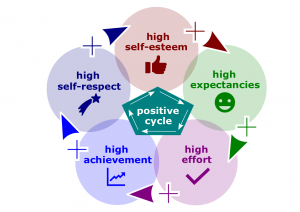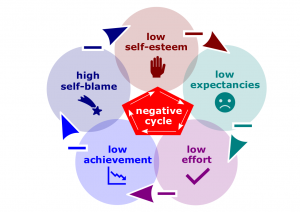Difference between revisions of "Self-esteem"
(→Related coursework) |
|||
| (2 intermediate revisions by 2 users not shown) | |||
| Line 3: | Line 3: | ||
#Self-respect; | #Self-respect; | ||
#An individual's degree of like or dislike for herself or himself. | #An individual's degree of like or dislike for herself or himself. | ||
| + | |||
| + | ==Definition== | ||
| + | According to [[Management by Robbins and Coulter (14th edition)]], | ||
| + | :[[Self-esteem]]. An individual's degree of like or dislike for herself or himself. | ||
| + | According to [[Looking Out, Looking In by Adler, Proctor (15th edition)]], | ||
| + | :[[Self-esteem]]. The part of the self-concept that involves an individual's evaluations of his or her self-worth. | ||
| + | |||
| Line 11: | Line 18: | ||
*[[Human Perceptions Quarter]]. | *[[Human Perceptions Quarter]]. | ||
| − | [[Category: Septem Artes Administrativi]][[Category: Articles]] | + | [[Category:Management]][[Category: Septem Artes Administrativi]][[Category: Articles]][[Category: Human Communications]] |
Latest revision as of 17:20, 10 July 2020
Self-esteem is one or more of the following:
- Confidence in one's own worth or abilities;
- Self-respect;
- An individual's degree of like or dislike for herself or himself.
Definition
According to Management by Robbins and Coulter (14th edition),
- Self-esteem. An individual's degree of like or dislike for herself or himself.
According to Looking Out, Looking In by Adler, Proctor (15th edition),
- Self-esteem. The part of the self-concept that involves an individual's evaluations of his or her self-worth.
Self-esteem cycle
Self‑esteem High self‑esteem Low self‑esteem Cycle

